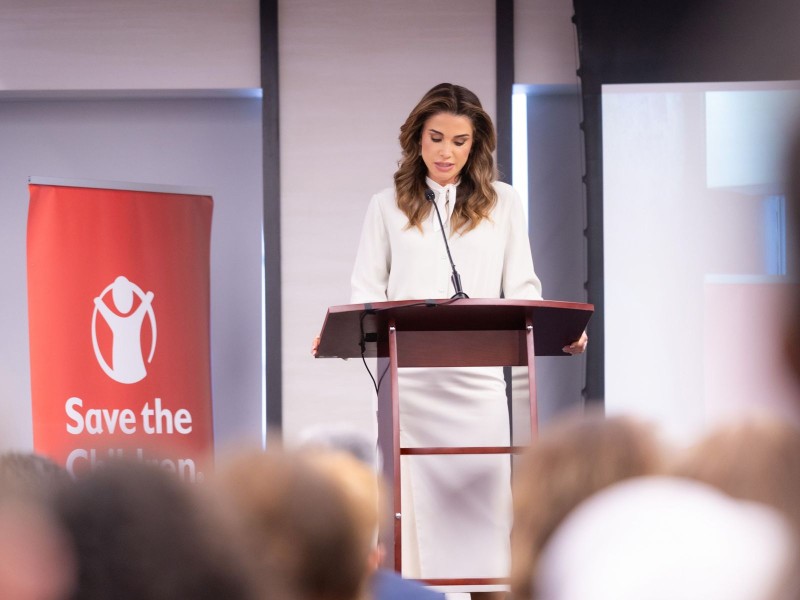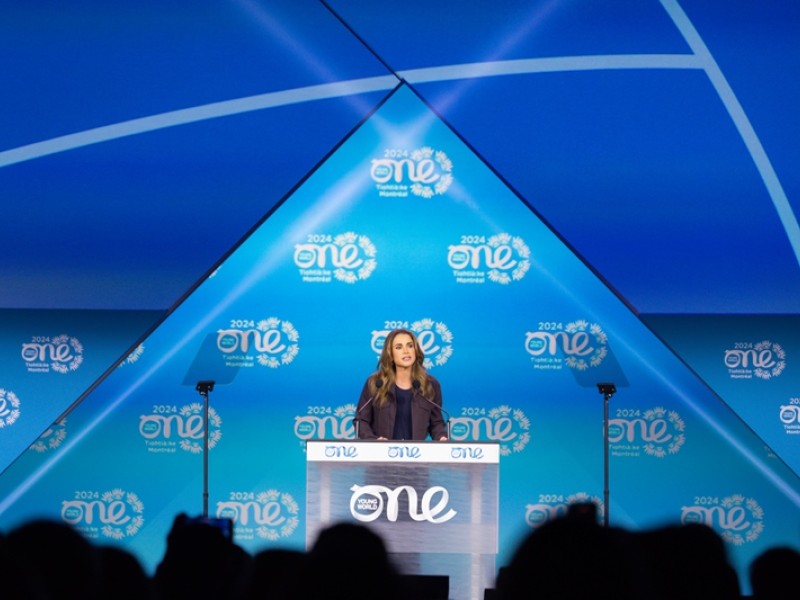Queen Rania's Speech at World Economic Forum Dead Sea 2013
A Regional Renaissance

Thank you, John.
And so to summarise where we are in the Arab world…
Millions of people need millions of jobs.
Generally, the people with the best education can’t find the jobs they want. And the people with the least education find most jobs – albeit low quality ones.
The majority of private sector employers are dissatisfied with graduates’ skills. And the majority of graduates are dissatisfied with the skills they’ve got.
Too often, the teachers who educate our young people don’t have the right skills or tools to do so. And the education young people receive is all but obsolete.
Why am I beginning my remarks to you today with a conclusion?
Because when it comes to the topic of employment in the Arab world, we’ve been saying the same things…pointing out the same facts…quoting the same reports…and drawing the same conclusions for years…and years…and years. In fact, my remarks at this forum exactly two years ago are as valid today as they were then! Nothing has changed.
Well, that’s not exactly true. Some things have changed.
We’ve watched investments in the wrong kind of education falter all over the Arab world. We’ve seen the ill-effects of increasing poverty in many countries in the MENA region. We’ve witnessed frustrations boil over as young people grow disillusioned.
And, yet, isn’t it ironic that, throughout the various seasons of Arab unrest, the debate on education has received so little air time? It seems to have slipped from our regional consciousness and our national priorities.
And isn’t it ironic how most of us in the Arab world want to carry the latest phones…own the trendiest gadgets… stay ahead of the curve on social media networks… while our schools and what we learn in them lag conspicuously behind?
Why is that?
The answer differs from country to country -- from shortage of resources and political instability…to languishing bureaucracies…and apathy… The reasons differ…but the answer is the same: there can be no excuses any more.
We must do better.
Our children deserve it. Our young people demand it. And our region depends on it.
“A new vision for Arab employment” isn’t about piecemeal approaches or incremental change. Those luxuries are not available to us anymore.
“A new vision for Arab employment” requires a regional renaissance.
And we can do it. With more innovation…openness and flexibility…and new partnerships.
But it can't be done without political will. And that doesn't come just from the top. It flows from the top to the bottom…from left and right… and to and from every point in between. That’s what a real renaissance is. That's what the right kind of renaissance delivers. True change that lasts for all seasons.
It starts with governments and the private sector forging closer ties…and ministers of education… labour…and finance finding synergies with CEOs and employers…to create tangible relationships between schools, skills and the marketplace.
In an ideal world, schools would feed employers with bright and hungry young minds… while employers would partner with schools to inspire entrepreneurship and innovation from which they would, ultimately, profit.
But our Arab world is not an ideal world.
In the last year, heavyweights such as the World Bank, the International Labour Organization (ILO), the Organisation for Economic Co-operation and Development (OECD) and McKinsey and Co. have suggested that we must redesign the ‘value chain of skills’ in the Arab World.
‘The value chain of skills?’
Right now, too many of our students graduate without literacy and numeracy skills… and without soft skills like critical thinking… creativity… teamwork… and communication.
Too often, confined to the classroom, we deprive them of the opportunity to learn life lessons through school exchanges… community projects… sports championships… and internships.
By focusing on the traditional teacher-student relationship, we rob students of the chance to explore self-learning…learning from peers…and e-learning.
And we don’t tap the rich resources on our doorstep: CEOs…community leaders…entrepreneurs… artists…doctors… or athletes. Perspectives and life lessons that inspire young minds.
If they’re not learning these skills in schools, they’re not going to use them in the marketplace.
In his book, “Creating Innovators: The Making of Young People Who Will Change the World”, Tony Wagner, an education specialist from Harvard, argues that because knowledge is so readily available nowadays on the internet, what you know matters less than what you can do with what you know.
That’s to say…preparing children just to be “college ready”, with a handful of exam results, could limit them. Preparing them to be “innovation ready”, on the other hand, with exam results… soft-skills…and transferable experiences opens up endless possibilities for personal and professional success. That’s the key to remaining relevant and employable in a fast-paced, competitive world.
Since I started with a conclusion, I think it is only appropriate that I conclude with an introduction.
An introduction to the Arab World we want.
An Arab world where entrepreneurs teach and our teachers innovate…
Where students learn in the playground, and dream in the classroom…
Where our young people start-up companies, fail, get inspired by their failure and create bigger and better ones…
Where the next big thing was developed by the kid next door…
Where there is a revolution every day in streets and squares across the Arab world…a revolution of ideas and innovations.
Ladies and gentleman, it is time to meet the new Arab World.
Thank you.
Featured
Queen Rania's official website
This website does not support old browsers. To view this website, Please upgrade your browser to IE 9 or greater
Your browser is out of date. It has known security flaws and may not display all features of this and other websites. Learn how to update your browser



